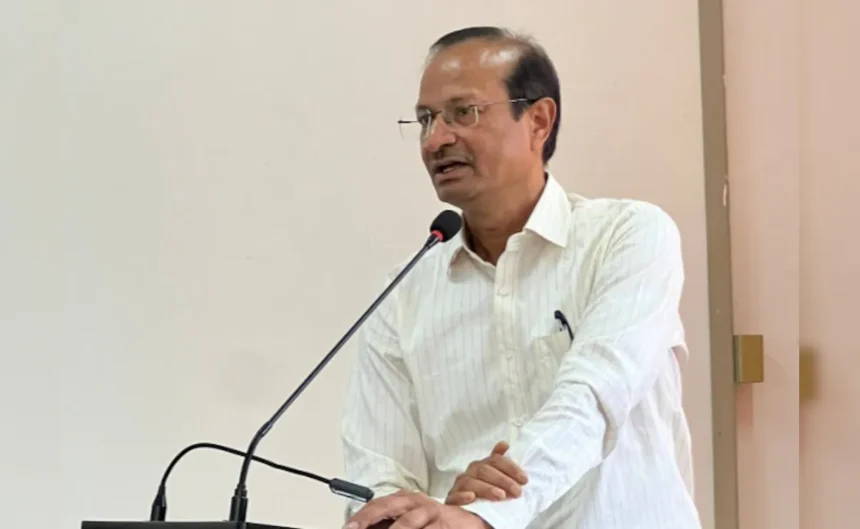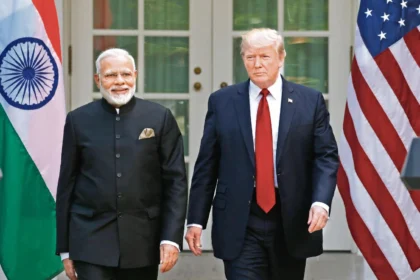“Psephologist Sanjay Kumar Faces FIRs After Retracting Maharashtra ‘Vote Chori’ Data, Triggering Institutional Backlash”
New Delhi: For decades, Sanjay Kumar and the Centre for the Study of Developing Societies (CSDS) have been pillars of India’s intellectual landscape, their data-driven surveys and sober analysis serving as a crucial barometer of the nation’s political mood. But in a whirlwind week, Kumar, a respected psephologist, finds himself in the epicentre of a political firestorm, facing police FIRs, government censure, and accusations of being a cog in a grand conspiracy to undermine Indian democracy.
His story is not merely about a data error in a social media post. It is the story of how a single mistake, made in a hyper-polarised environment, became a flashpoint in a simmering war between India’s opposition and its constitutional bodies—a conflict over voter rights, institutional credibility, and the very definition of a free and fair election.
The immediate trigger was a post on X August 17. In the post, Kumar shared specific data which claimed a significant decrease in voter numbers in two Maharashtra assembly seats, Ramtek and Deolali, when comparing the rolls for the state assembly election to those from the 2024 general election, held nearly six months earlier. The post landed like a match in a tinderbox. For months, the opposition, led by Congress leader Rahul Gandhi, had been alleging large-scale “vote theft” in Maharashtra and other states, accusing the Election Commission of India (ECI) of complicity. Kumar’s data, from a credible source, appeared to be the smoking gun they were looking for.
Two days later, Kumar deleted the post and issued a public apology. “I sincerely apologise for the tweets posted regarding Maharashtra elections,” he wrote on X. “An error occurred while comparing the data of 2024 LS and 2024 AS. The data in the row was misread by our Data team… I had no intention of dispersing any form of misinformation.”
But in today’s India, retractions rarely extinguish the fire; they only provide more fuel. The apology was seized upon not as a mark of academic integrity, but as an admission of guilt in a deliberate plot.
The swift and severe backlash
The reaction from the ruling Bharatiya Janata Party (BJP) was immediate and ferocious. National spokesperson Gaurav Bhatia accused the Congress of making “baseless” claims in “collusion” with a think tank. He branded Kumar a “puppet” whose “false data” was used by Rahul Gandhi to attack the ECI.
The attack quickly escalated from the political to the institutional. In parliament, Union education minister Dharmendra Pradhan declared that government funds should not be used for “propaganda against Constitutional establishments.” He announced that the Indian Council of Social Science Research (ICSSR), which provides significant funding to CSDS, would seek an explanation.
That explanation soon took the form of a formal show-cause notice. The ICSSR, in a public statement, took “serious cognisance of the data manipulation by CSDS and its attempt to create a narrative with the intention of undermining the sanctity of the Election Commission of India.” It accused the institution of a “gross violation of the Grant-in-Aid rules.”
The notice, a copy of which was accessed by The Hindu, went far beyond the single tweet. It listed eleven “major irregularities,” demanding CSDS explain why its grant – which covers up to 90% of staff salaries and 50% of administrative costs – should not be cancelled. It cited CSDS’s recent studies on the ECI’s Special Intensive Revision (SIR) exercise in Bihar as evidence of a “biased interpretation” intended to “deliberately scandalise and malign the reputation and image of ECI.” The notice also dredged up alleged “administrative and financial irregularities” concerning faculty appointments, HRA payments, and a failure to be audited by the CAG.
The message was clear: this was not just about one professor’s error, but a full-scale institutional reckoning. To cap it off, FIRs were filed against Sanjay Kumar by police in Nashik and Nagpur for allegedly spreading false claims. The academic had become the accused.
The context: A crisis of trust
To understand the ferocity of the response, one must look at the work Kumar and CSDS were doing just before the controversy. Their research was not happening in a vacuum; it was directly addressing the most contentious political issue of the moment: the ECI’s SIR exercise in Bihar.
Launched in June, the SIR was billed by the ECI as a clean-up of electoral rolls ahead of the state’s assembly polls. But its stringent documentation requirements – demanding birth certificates of parents for those born after 1987 – sparked immediate alarm. Critics warned it would lead to the mass disenfranchisement of the poor, Dalits, migrants, and other marginalised groups who often lack such legacy documents.
In a two-part series published in
The Hindu on August 16 and 17, Lokniti-CSDS laid bare the scale of the problem. Their multi-state survey revealed shocking data:
- More than half of all respondents did not have a birth certificate.
- In states like Madhya Pradesh and Uttar Pradesh, over two-thirds of respondents lacked their parents’ birth certificates.
- Only 5% of all respondents were “No Document Citizens,” having none of the 11 documents mandated by the ECI. Three-fourths of this group were from the lower half of the economic order.
In an interview with Frontline magazine published on August 18, the day after his fateful tweet, Kumar was blunt. “Getting these documents for an average citizen is not easy. It’s very difficult,” he said, warning that the SIR exercise risked making millions feel “cheated, disempowered.” He also pointed to their survey data showing a “systematic decline in high trust and increase in no trust” in the ECI between 2019 and 2025 across all six states surveyed. He noted presciently, “When BJP spokespersons speak, it looks like they’re speaking on behalf of the Election Commission. That could have been avoided.”
In an interview with Karan Thapar for The Wire just days before the FIRs were filed, Kumar highlighted how his data challenged the ECI’s own narrative about its declining credibility.
“The opinion in the Election Commission is that the trust of the opposition in the Election Commission has gone down. I think this data should be an eyeopener that it’s not only the trust of the opposition which has gone down. It is also the trust among the people for the Election Commission has come down,” he said. He then pointed to the stark numbers: “Look at the data of 2019. The number of people who said ‘no trust’ is very small, all in single digits… Moving from 6% to 22%, 25% – it’s a huge jump and this is an indication of how people are losing trust in the Election Commission.”
Rahul Gandhi in his press conference on Bengaluru’s Mahadevpura assembly constituency, used only Election Commission data and not any other survey data, certainly not CSDS’s. But Kumar’s admissions were misused to try and discredit the very serious charges on the EC’s functioning, which have only gathered momentum since then.
This is because Kumar and CSDS were also providing empirical data that gave weight to the opposition’s political campaign. Rahul Gandhi was concurrently leading a ‘Voter Adhikar Yatra’ across Bihar, echoing these very concerns.
The ECI, for its part, was already on the defensive. On August 17, Chief Election Commissioner (CEC) Gyanesh Kumar held a combative press conference. He dismissed allegations as an “insult to the Constitution” and gave Rahul Gandhi a seven-day ultimatum: file a signed affidavit with his claims about Karnataka voter rolls, or “apologise to the nation.” He refused to provide machine-readable voter lists or CCTV footage, citing voter privacy—specifically, the privacy of “our mothers, daughters-in-law, daughters.”
This defence was widely criticised as deflection.
As academic Apoorvanand wrote, “What should have been a sober, reassuring press conference became a brazen display of arrogance, deflection, and evasion… His demeanour displayed not the neutrality of a civil servant, but the combative swagger of a BJP stalwart.”
This was the charged atmosphere into which Sanjay Kumar’s erroneous tweet about Maharashtra was launched—a tweet that inadvertently connected the opposition’s political rhetoric in Bihar with its previous allegations of “vote theft” in Maharashtra.
The Maharashtra question: A case study in Panvel
The controversy has renewed focus on the electoral data from Maharashtra. Rahul Gandhi, during his Bihar yatra, claimed the ECI created “about 1 crore new voters” in the state between the Lok Sabha and assembly polls. However, the ECI has refuted this specific number.
While such a state-wide data analysis provides a macro view, specific on-the-ground allegations offer a look at how these numbers might translate into electoral realities. Detailed claims have emerged from the Panvel assembly constituency in Raigad district, in a report by Frontline magazine.
There, the losing MVA candidate, Balaram Patil, alleged that his team uncovered 85,211 voters registered more than once across Panvel and its neighbouring constituencies. His pre-election writ petition to the Bombay high court to have the duplicate names deleted was rejected.
After losing to the BJP’s Prashant Thakur by a margin of 51,091 votes, Patil’s team began a painstaking post-election analysis of marked electoral rolls from their booth agents. By analysing 490 of the 574 booths, they claim to have found 11,628 votes that were cast two or more times by the same individuals using different voter IDs. “My allegation is that this malpractice is being done by the BJP with the active help of the Election Commission,” Patil told Frontline, calling it “daylight robbery of the election.” He says he mailed his findings to the ECI in June but has received no response.
The BJP MLA from Panvel, Prashant Thakur, dismissed the allegations as a publicity stunt. “It is possible that some people might have their names in two different constituencies or even two different booths. This can’t be called fraud,” he said, noting the large influx of new residents to the area.
A chilling effect?
The saga of Sanjay Kumar has now transcended into a debate over data.
The government-led campaign, show-causes and FIRs have become a cautionary tale about the shrinking space for independent, critical inquiry in India. The swift, multi-pronged attack on both an individual academic and a premier research institution sends a chilling message to others who might dare to publish findings inconvenient to the government.
For Sanjay Kumar, the ordeal is personal and professional. For CSDS, it is existential. But for India, the stakes are far greater. The controversy has laid bare the deep fractures in the country’s democratic consensus, where a constitutional body like the ECI is viewed with deep suspicion by half the political spectrum, and where academic research that appears to validate that suspicion is treated not as a contribution to public discourse, but as a conspiracy.
The Supreme Court has since intervened in the Bihar SIR, ordering the ECI to publish a booth-wise list of the 65 lakh electors excluded from the draft roll with reasons for deletion, and compelling it to accept Aadhaar as proof of identity. Sanjay Kumar, who spent his career measuring public opinion has now become a measure of the nation’s democratic health itself.
Also Read: Meerut Toll Plaza Tribute 2025: Staff Salute 50+ Army Personnel Days After Brutal Attack on Soldier








